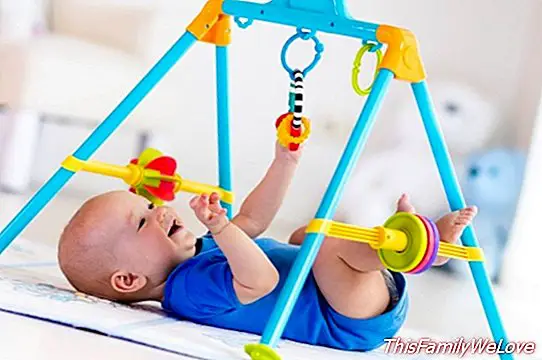Achievements in the development of babies from 0 to 3 years

One of the challenges that parents face with babies and young children is to know when their children's evolution is following the usual rhythms and when there may be a specific problem in which they have to intervene.
Children go through different maturational cycles as they grow. In the education sector, and increasingly in families, we are aware of the need to know the different rhythms of each child to prevent later difficulties and disorders.
Changes in children in the Children's cycle
In the first and second cycle of Infantile is when more maturational changes occur and, therefore, more that development is appreciated. Although delays are not common, there may be children who do not achieve the desirable level in a specific area. It can be difficult for families to discover it, so the school plays a fundamental role in its detection and prevention.
However, families with children in the Infant stage should not be alarmed by small signals, since between zero and three years, and even up to six, there are usually no specific maturational delays. The important thing is not the rhythm in which the child evolves, but to check that this evolution is occurring.
Parents tend to be in too much of a hurry for their children to achieve certain actions because, for example, at their age a brother had succeeded. However, as parents we should not set a deadline to reach a specific goal, but help them to achieve small goals little by little and at their own pace. If we tune the goals and demand too much, our children will feel frustrated and blocked.
Achievements of children's evolution from 0 to 2 years
We analyze some of the specific specific areas in the evolution of Infantile.
- Fine and thick psychomotricity
To promote the fine and gross psychomotor skills in this stage is considered the work par excellence. There are a series of stages that should not be skipped. A baby must be able to make revolving movements on itself, have the ability to crawl and then crawl. The crawling is fundamental for the cognitive development of the child, since it facilitates the occulomanual coordination and the movement necessary for the subsequent literacy process.
After the crawl, the time will come when you can start to stand up and start walking, and we will make sure that you coordinate hands and legs properly, you can jump, walk to the 'lame leg', etc.
Not skipping these stages is essential for you to acquire future learning. Parents should bear in mind that any sign that alerts them, the first thing they should do is go to the doctor. When the specialist discards physical problems it will be time to work with him from a behavioral or educational point of view.
- The language
From the pedagogical point of view, the margin to acquire language is much wider than what society is accustomed to. We have the wrong idea that it has to be completed between two and three years. But it is a complex process that requires preparatory phases and whose difficulties begin to be detected from the second cycle of Infant.
In this case we should never be alarmed beforehand. The important thing is to see if the child is able to start making sounds or linking words. We will go the right way whenever there are signs of evolution, even if they are scarce. As parents, to help them we must not force them, but use a fluid and varied language, speak to them correctly and very frequently.
- Ability to maintain attention
It is an aspect that often worries families, but the Infant stage is premature to detect a problem of these characteristics because they are still immersed in the learning process. The ideal is to keep the child's attention by teaching him to be seated with activities that motivate him.
The objectives in terms of time spent sitting and attentive should be small and increase as the child grows. Children, as they get older, mature and manage to stay in this state for longer. A warning signal could be that our child is sitting less and less time or is nervous in this position.
- Understanding
Understanding is difficult to measure when they are very small, however, from the first ages they understand and understand us.
The difficulties of understanding would be manifested if we ask the child to fulfill a series of orders, we are sure that he has listened, and yet he does not execute them. If the understanding develops naturally, it will be more and more capable of understanding and executing multiple requests at the same time. If the child has problems in this area, he may have misbehaving behaviors of blockage, frustration or rejection. A warning signal is a child who does not listen or disobey constantly, because he does not see himself capable of fulfilling what is asked of him.
In conclusion, we recommend that families, if your child shows any warning sign of maturational cycles, talk to the school as soon as possible as early detection in the Infant stage will help us to make a prevention of risk situations that can lead to serious problems in their social and cognitive development.
María Campo Director of NClic-Kimba




